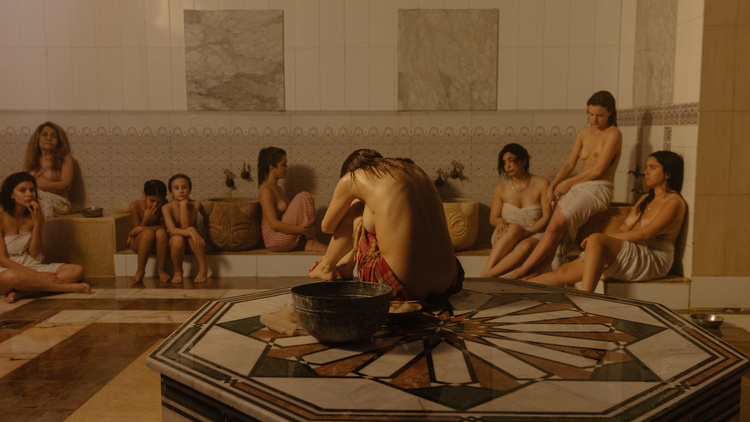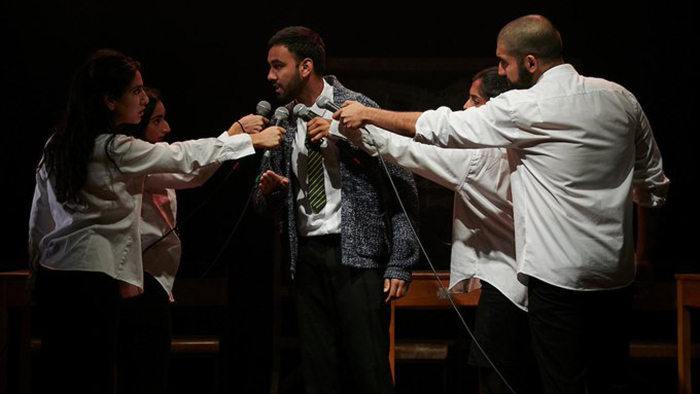[vc_row][vc_column][vc_column_text]Name of Art Work: Rita Sue and Bob Too by Andrea Dunbar
Artist/Company: Out of Joint
Date: September – December 2017
Venue: Royal Court (as part of a UK tour)
Brief description of the artwork/project: Andrea Dunbar’s play Rita Sue and Bob Too was commissioned by Max Stafford-Clarke, then artistic director of Royal Court, in 1982. It is set on the estate Dunbar grew up on, and tells the story of the relationship between a married man and his two teenage babysitters. Out of Joint – a theatre company founded by Stafford-Clarke – revived the play to tour in Autumn and Winter 2017 as co-production with the Royal Court. [/vc_column_text][vc_single_image image=”106743″ img_size=”full” add_caption=”yes”][vc_custom_heading text=”Why was it challenged?” font_container=”tag:h3|text_align:left” use_theme_fonts=”yes”][vc_column_text]The play was originally to be co-directed by Stafford-Clarke and Kate Wasserburg who joined the company in July 2017, but Stafford Clark left Out of Joint on September 11th, three days into the rehearsal period. One month later, on 20th October, it emerges that he was forced out of the company for inappropriate, sexualised behaviour. Around the same time, Vicky Featherstone – artistic director of the Royal Court – organises a day of action in response to the Weinstein revelations, looking at sexual harassment in theatre, in the context of the #MeToo movement. When Featherstone and the production team went to see the play on tour, they were concerned that the content, particularly of the first scene, which shows Bob grooming the girls for sex, which is then enacted in his car, and the association with Max Stafford-Clark, was directly at odds with the theatre’s day of action.[/vc_column_text][vc_custom_heading text=”What action was taken?” font_container=”tag:h3|text_align:left” use_theme_fonts=”yes”][vc_column_text]On 13th December, The Royal Court decides to cancel the planned production of Rita Sue and Bob too. They release a joint statement with Out of Joint:
“The departure of Max Stafford-Clark from Out of Joint and the recent allegations in the media have coincided with Royal Court’s response to the spotlight on our industry and the rigorous interrogation of our own practices….On our stage [at the day of action] we recently heard 150 stories of sexual harassment and abuse and therefore the staging of this work, with its themes of grooming and abuses of power on young women, on that same stage now feels highly conflictual.”[/vc_column_text][vc_custom_heading text=”What happened next?” font_container=”tag:h3|text_align:left” use_theme_fonts=”yes”][vc_column_text]The cancellation of the play met a lot of criticism and accusations of censorship, and is described as “punishing women for the misdeeds of men.” Two days after the cancellation, the Royal Court decides to reinstate the play, with a statement from Vicky Featherstone: “I have … been rocked to the core by accusations of censorship and the banning of a working-class female voice. For that reason, I have invited the current Out of Joint production of Rita, Sue and Bob Too back to the Royal Court for its run. As a result of this helpful public debate we are now confident that the context with which Andrea Dunbar’s play will be viewed will be an invitation for new conversations.”[/vc_column_text][vc_custom_heading text=”Reflections” font_container=”tag:h3|text_align:left” use_theme_fonts=”yes”][vc_column_text]Vicky Featherstone
This process made me reflect on what true censorship means. This writer was not being censored at all, Andrea Dunbar’s voice had been fully celebrated and given a wide platform over the years and through the long tour of this play leading up to our run. It was the context within which the co-production had been created which was changing and challenging. In the light of Max’s departure from Out of Joint, we made the initial decision to take the work off. It felt naïve of me to still put the play on when the production (directed now by Kate Wasserberg), which I admired, chose not to carry the burden of the changed context in any way. Once this decision was public and the accusation of censorship had been levelled at us, it was clear that no statement could counter that – rather a gesture had to. Hence putting it back on. Putting the play back on enabled us to shift the context and was not about censorship.
Writers at the Royal Court do experience true, profound and dangerous censorship – we work with gay writers in Zimbabwe who get beaten up on the street for their sexuality, Palestinian and Syrian writers who can’t get visas to come to workshops, and with women from UK communities who demand to remain anonymous for fear of the backlash against their stories.
Kate Wasserburg
The Royal Court team were concerned about the association with Max Stafford Clark – although I had taken over very early in rehearsals he is of course historically associated with the play. When they first came to see the play on tour they raised concerns about the content of the play and of course there was a lot of press coverage about Max leaving the company at the time and this definitely played into the decision to cancel the run at the Royal Court.
I stand by the play and the production and I’m very glad it was reinstated. The revival played to over 30,000 people and for us is the cornerstone of our company, putting political work from under-represented voices on stage. It is doing everything that an Out of Joint production should. It talks about poverty, Thatcherism, gender oppression, class oppression but it’s really funny and people all over the country turned up in droves and brought their auntie or grandma, or mum or dad. They stayed for the after show talk which I did in almost every venue. We talked about everything from the Rotherham grooming scandal to Thatcherism, swearing, economics, – it felt hugely important to us as a great national work.
I don’t think the cancellation in London made a difference to audiences on tour. Regionally they embraced it and took it on its own terms. It made the run in the Royal Court fascinating in a way that it probably wouldn’t have been if had not been cancelled. The meta conversation that was happening in that audience was really interesting and we had some incredible post show talks there too – the passionate engagement with Andrea’s writing was very exciting.[/vc_column_text][three_column_post title=”Case studies” full_width_heading=”true” category_id=”15471″][/vc_column][/vc_row]





